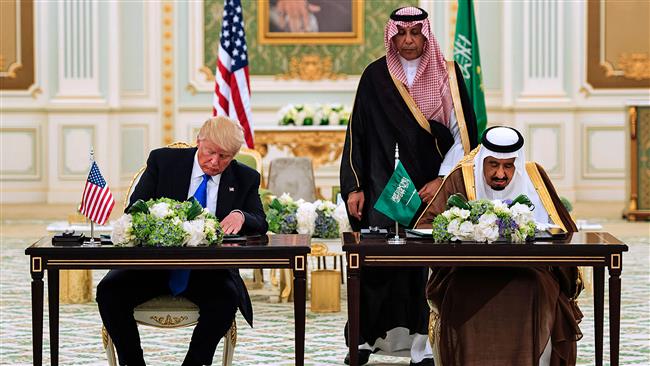
RNA - “It appears the Trump administration is counting on the country with the worst human rights record in the region to enforce peace and security in the Middle East," Democratic Senator Chris Murphy of Connecticut wrote in an op-ed piece for the Huffington Post on Saturday, describing the arms sale as “a terrible idea.”
Murphy, who is a member of the Senate Foreign Relations Committee, further pointed to the fact that the monarchy has persistently used US-supplied weaponry against civilians in the region and specifically in neighboring Yemen.
“[Former President Barack] Obama withheld precision-guided munitions because the Saudis were using US-provided munitions to repeatedly target civilian and humanitarian sites in their bombing campaign inside Yemen, despite regular protests from the United States," he wrote.
“By selling the Saudis these precision-guided weapons more — not fewer — civilians will be killed because it is Saudi Arabia’s strategy to starve Yemenis to death to increase their own leverage at the negotiating table. They couldn’t do this without the weapons we are selling them,” the senator emphasized.
Murphy went on to insist that more Yemenis have since been radicalized and blamed the US for Saudi Arabia’s military aggression against their country. He further argued that the advanced armaments supplied to the despotic regime would not be used against intended targets such as the Daesh (ISIL) and al-Qaeda terrorist group.
“The Saudis’ obsession with Iran, and the proxy wars (like Yemen) that flow from this obsession, mean that they have little bandwidth to go after extremist groups,” wrote the US lawmaker, arguing that even if Trump tries to exert pressure on the Saudis, they will likely not concede since “they are already getting everything they could ever want militarily from the United States.”
The Democratic senator also pointed out that the weapons deal "was negotiated by Jared Kushner, the president’s son-in-law, who has zero experience in foreign relations generally, or Saudi arms sales specifically."
This is while Trump praised the unprecedented arms deal with the Saudis on Saturday, boasting that it will generate job growth for Americans.
"Tremendous investments in the United States. Hundreds of billions of dollars of investments into the United States and jobs, jobs, jobs," Trump stated referring to the massive weapons sale.
Meanwhile, the Trump administration has claimed that thearms package aims to bolster Saudi Arabia's defense capabilities by enhancing their military hardware and relevant services while also allowing the US to reduce its military commitment in the region.
"This package of defense equipment and services support the long-term security of Saudi Arabia and the (Persian) Gulf region in the face of Iranian threats, while also bolstering the Kingdom's ability to contribute to counter terrorism operations across the region, reducing the burden on the US military to conduct those operations," the White House said in a statement.
Murphy, however, underlined that the arms deal would escalate the proxy war in the region, adding that this is not “our fight.” He then argued that the $110 billion in funds could instead be applied to a strategy aimed at attaining global security, such as providing primary education in Africa.
“Yes, this is the Saudi’s money, but we shouldn’t just assume that the path to global security is through the spread of more and more weapons,” he reasoned, noting that terrorist groups “thrive on economic destitution” that more education could combat.
Murphy concluded that while the Saudi regime remains an American ally and cooperates with the US in what he referred to as the battle against extremist groups, it is “a deeply imperfect friend” to trust with these highly calibrated weaponry.
847/940